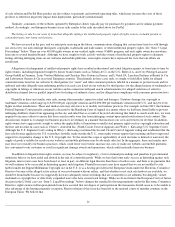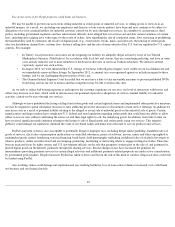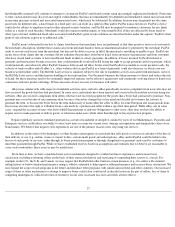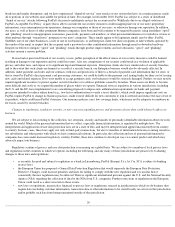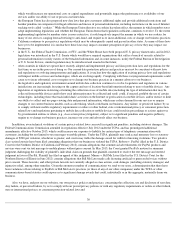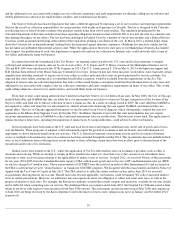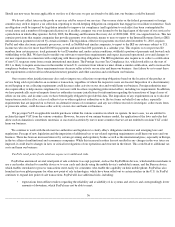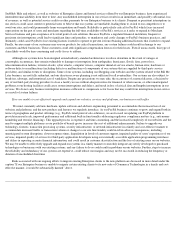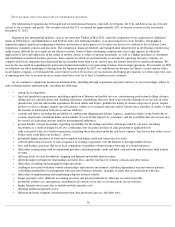eBay 2013 Annual Report Download - page 32
Download and view the complete annual report
Please find page 32 of the 2013 eBay annual report below. You can navigate through the pages in the report by either clicking on the pages listed below, or by using the keyword search tool below to find specific information within the annual report.
which would increase our operational costs or capital expenditures and potentially impact the performance or availability of our
services and/or our ability to use or process customer data;
In addition, even technical violations of certain privacy-related laws can result in significant penalties, including statutory damages. The
Federal Communications Commission amended its regulations effective July 2012 under the TCPA, and has promulgated additional
amendments, effective October 2013, which could increase our exposure to liability for certain types of telephonic communication with
customers, including but not limited to text messages to mobile phones. Under the TCPA, plaintiffs may seek actual monetary loss or statutory
damages of $500 per violation, whichever is greater, and courts may treble the damage award for willful or knowing violations. Two putative
class-action lawsuits have been filed containing allegations that our businesses violated the TCPA. Roberts v. PayPal (filed in the U.S. District
Court for the Northern District of California in February 2012) contains allegations that commercial advertisements for PayPal products and
services were sent via text message to mobile phones without prior consent. In May 2013, the Court granted PayPal's motion for summary
judgment challenging the viability of plaintiff's individual claim on grounds that plaintiff consented to receive the text message and entered
judgment in favor of PayPal. Plaintiff has filed an appeal of this judgment. Murray v. Bill Me Later (filed in the U.S. District Court for the
Northern District of Illinois in June 2012) contains allegations that Bill Me Later made calls featuring artificial or prerecorded voices without
prior consent. These lawsuits, and other private lawsuits not currently alleged as class actions, seek damages (including statutory damages) and
injunctive relief, among other remedies. Given the enormous number of communications we send to our users, a determination that there have
been violations of laws relating to PayPal's or Bill Me Later's practices (or those of any of our other companies) under the TCPA or other
communications-based statutes could expose us to significant damage awards that could, individually or in the aggregate, materially harm our
business.
Also, we have, and post on our websites, our own privacy policies and practices, concerning the collection, use and disclosure of user data.
Any failure, or perceived failure, by us to comply with our posted privacy policies or with any regulatory requirements or orders or other federal,
state or international privacy or consumer protection-related laws and
30
• the European Union has also proposed new data laws that give customers additional rights and provide additional restrictions and
harsher penalties on companies for illegal collection and misuse of personal information, including restrictions on the use of Internet
tracking tools called “cookies.” While the European Union directive on cookies has taken effect, the manner in which member states
adopt implementing legislation, and whether the European Union deems that legislation sufficient, continues to evolve. To the extent
implementing legislation by member states is more restrictive, it could negatively impact the manner in which we use cookies for
many of our services, ranging from advertising to anti-
fraud, and require us to incur additional costs or change our business practices;
• California continues to pass privacy regulations which may be subsequently copied and passed in other states. As many of these laws
have yet to be implemented, it is unclear how these laws may impact consumer perception of privacy or how they may impact our
businesses;
• in the U.S., the Federal Trade Commission, or FTC, and the White House have both proposed U.S. privacy frameworks, and in 2012,
legislation was introduced in the U.S. Senate which would have required organizations that suffer a breach of security related to
personal information to notify owners of the breached information and, in some instances, notify the Federal Bureau of Investigation
or U.S. Secret Service; similar legislation may be introduced and enacted in the future;
• other countries in which we operate have recently adopted and implemented privacy and data protection laws and regulations for the
first time, or are in the process of doing so. Our current data protection policies and practices may not be consistent with new laws
and regulations or evolving interpretations and applications. It is unclear how the application of existing privacy laws and regulations
will impact mobile services and technologies, which are evolving rapidly. Complying with these varying national requirements could
cause us to incur substantial costs or require us to change our business practices in a manner adverse to our business;
• the legislative and regulatory environment around mobile data collection continues to evolve. Legislators and regulators in various
jurisdictions are increasingly focusing on the capture and use of location
-based information relating to users of mobile devices. Any
legislation or regulations restricting or limiting the collection or use of mobile data (including the type of information that may be
collected from mobile devices and/or how such information may be collected and used) could, if enacted, prohibit the use of certain
technologies, including those that track individuals' activities on the Internet or geolocation via mobile devices, and/or restrict or limit
our ability to collect and use page viewing data and personal information, which may reduce demand for our services or require
changes to our current business models, such as advertising, which could harm our business. Any failure, or perceived failure, by us
to comply with new mobile regulatory requirements or orders or other federal, state or international privacy or consumer protection-
related laws and regulations pertaining to mobile data collection or mobile devices could result in proceedings or actions against us
by governmental entities or others (e.g., class action privacy litigation), subject us to significant penalties and negative publicity,
require us to change our business practices, increase our costs and adversely affect our business.



